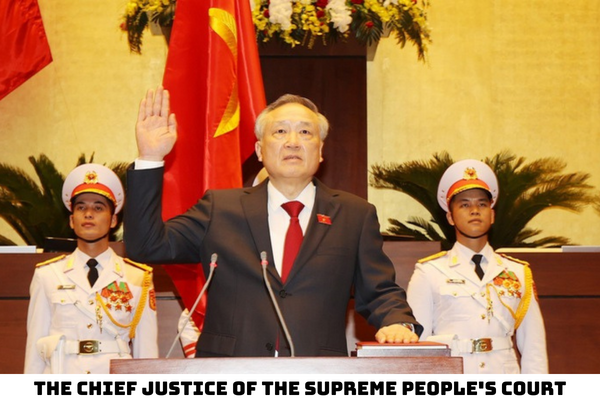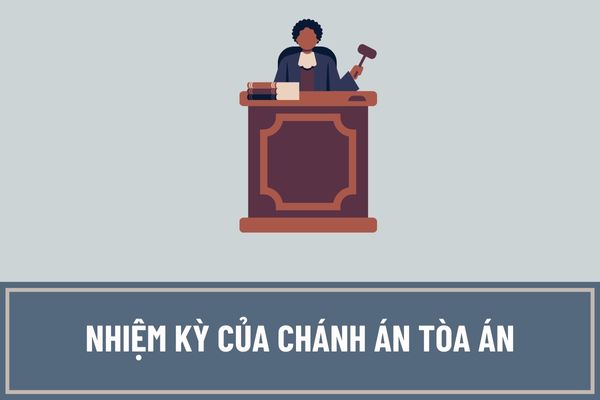Vietnam: How long is the term of office of the Chief Justice of the Supreme People's Court? Is the Chief Justice of the Supreme People's Court required to take an oath before the National Assembly?
- How long is the term of office of the Chief Justice of the Supreme People's Court in Vietnam?
- Is the Chief Justice of the Supreme People's Court required to take an oath before the National Assembly of Vietnam?
- What are the procedures for electing the Chief Justice of the Supreme People's Court in Vietnam?
How long is the term of office of the Chief Justice of the Supreme People's Court in Vietnam?
Pursuant to Article 26 of the Law on Organization of People's Courts 2014 as follows:
The Chief Justice of the Supreme People’s Court
1. The Chief Justice of the Supreme People’s Court shall be elected, relieved from duty, or dismissed by the National Assembly at the proposal of the President.
The term of office of the Chief Justice of the Supreme People’s Court must follow the term of the National Assembly.
2. Upon the expiration of the term of the National Assembly, the incumbent Chief Justice of the Supreme People’s Court shall continue to perform his/her duties until the National Assembly of the new legislature elects a new Chief Justice.
Thus, the term of office of the Chief Justice of the Supreme People's Court shall depend on the term of the National Assembly of Vietnam.
Pursuant to Article 2 of the Law on Organization of the National Assembly 2014 as follows:
Term of the National Assembly
1. The term of the National Assembly is five years, counting from the opening date of the first session of the National Assembly of a term to the opening date of the first session of the National Assembly of the succeeding term.
2. Sixty days before the expiration of the term of the National Assembly, a new National Assembly shall be elected.
3. In special cases, the National Assembly shall decide to shorten or extend its term at the proposal of the Standing Committee of the National Assembly, if at least two-thirds of the total number of National Assembly deputies vote for it. The extension of a term of the National Assembly must not exceed twelve months, except in wartime.
Thus, because the term of each National Assembly session is 05 years, the term of office of the Chief Justice of the Supreme People's Court also lasts 05 years.

Is the Chief Justice of the Supreme People's Court required to take an oath before the National Assembly of Vietnam?
Pursuant to Article 8 of the 2014 Law on Organization of the National Assembly on the election of positions in the state apparatus as follows:
Election of positions in the state apparatus
...
8. After being elected, the President, Chairperson of the National Assembly, Prime Minister, and Chief Justice of the Supreme People’s Court shall take an oath of loyalty to the Fatherland, the People, and the Constitution.
Thus, after being elected, the Chief Justice of the Supreme People's Court must take an oath of loyalty to the Fatherland, the People, and the Constitution.
What are the procedures for electing the Chief Justice of the Supreme People's Court in Vietnam?
Pursuant to Clause 1, Article 26 of the Law on Organization of People's Courts 2014 as follows:
The Chief Justice of the Supreme People’s Court
1. The Chief Justice of the Supreme People’s Court shall be elected, relieved from duty or dismissed by the National Assembly at the proposal of the President.
The term of office of the Chief Justice of the Supreme People’s Court must follow the term of the National Assembly.
Thus, the Chief Justice of the Supreme People’s Court shall be elected, relieved from duty, or dismissed by the National Assembly at the proposal of the State President.
Accordingly, the procedures for electing the Chief Justice of the Supreme People's Court in Vietnam are detailed in Article 35 of the Regulations of the National Assembly session promulgated together with Resolution 71/2022/QH15 as follows:
- The State President presents the list of nominees for election by the Chief Justice of the Supreme People's Court
- In addition to the list proposed by the State President, delegates of the National Assembly have the right to recommend or nominate themselves to the position of Chief Justice of the Supreme People's Court. nominate.
- Delegates of the National Assembly discuss at the National Assembly Delegations; The President of the National Assembly may meet with the Heads of National Assembly Delegations and invite the State President to attend to discuss relevant issues.
- The State President shall report to the National Assembly on the explanation and reception of opinions discussed at the National Assembly delegation of delegates of the National Assembly.
- The Standing Committee of the National Assembly shall submit to the National Assembly for decision the list of additional nominees recommended by delegates of the National Assembly or self-nominees (if any).
- The National Assembly discusses and votes on the list to elect the Chief Justice of the Supreme People's Court
- The National Assembly establishes a Vote Counting Board.
- The National Assembly elects the Chief Justice of the Supreme People's Court by secret ballot.
- The vote counting board reports the results of vote counting and voting results.
- The Standing Committee of the National Assembly submits to the National Assembly a draft resolution to elect the Chief Justice of the Supreme People's Court
- The National Assembly discusses.
- The Standing Committee of the National Assembly shall report to the National Assembly on the explanation and reception of the opinions of delegates of the National Assembly and revise the draft resolution.
- The National Assembly votes to approve the draft resolution.
- The Chief Justice of the Supreme People's Court takes the oath.
LawNet
